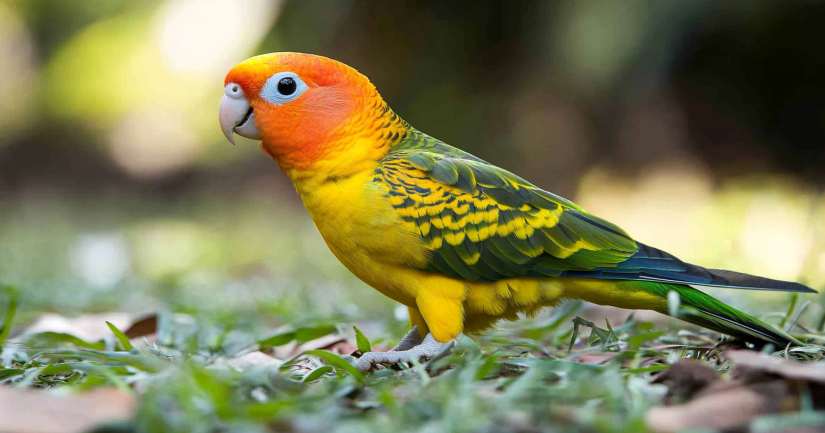
Are you curious about your feathered friends, Fly into our Parrot Quiz. How Much Do You Know About These Brilliant and Talkative Birds?. Parrots are among the most intelligent and colorful birds in the world, known for their incredible ability to mimic sounds, solve problems, and form strong social bonds. This Parrot Quiz will put your knowledge to the test, exploring everything from their dazzling plumage to their impressive cognitive skills. Found in tropical and subtropical regions worldwide, parrots have fascinated humans for centuries with their playful personalities and unique vocal abilities.
Parrots belong to the Psittacidae family, which includes over 400 species ranging from the tiny Budgerigar to the massive Hyacinth Macaw. Their intelligence rivals that of primates, with some species demonstrating the ability to use tools, recognize words, and even understand concepts like counting and problem-solving.
The parrot’s charm is irresistible, but why stop there? Explore the mysteries of the Owl Quiz or venture into the bold colors of the Magpie Quiz.
Begin Your Parrot Quiz Journey
What Makes Parrots So Intelligent? Key Insights for the Parrot Quiz
One of their most famous traits is their ability to mimic human speech and other sounds. While not all parrots talk, species like the African Grey Parrot are known for their extensive vocabularies, with some individuals learning hundreds of words. Research suggests that parrots don’t just repeat sounds—they actually understand context and meaning, making them one of the most cognitively advanced bird groups.
Where Do Parrots Live? Exploring Their Natural Habitats
Parrots are primarily found in tropical and subtropical regions, with the highest diversity in South America, Australia, and Southeast Asia. They thrive in a variety of environments, including rainforests, savannas, woodlands, and even urban areas. Some species, like the Monk Parakeet, have adapted to city life, forming wild flocks in unexpected places.
Most parrots are arboreal, meaning they spend most of their lives in trees. Their strong, curved beaks are perfect for cracking open nuts and seeds, while their zygodactyl feet—two toes facing forward, two facing backward—allow them to grasp branches with ease. Their diet includes fruits, seeds, nectar, and insects, with some species playing a critical role in seed dispersal and pollination.
Why Are Parrots So Social? Understanding Their Complex Communication
Parrots are highly social birds, often living in flocks that provide safety and companionship. Within these groups, they develop intricate communication methods, including vocal calls, whistles, and even body language. In captivity, parrots often form strong emotional bonds with humans, mirroring the tight social connections they experience in the wild.
In their natural habitats, some parrot species exhibit remarkable teamwork and cooperation. They work together to find food, warn each other of predators, and even share parenting responsibilities. Their ability to recognize individual flock members and remember past interactions highlights their impressive social intelligence.
Are Parrots in Danger? Conservation Challenges and Efforts
Despite their adaptability, many parrot species face serious conservation threats, primarily due to habitat destruction, illegal pet trade, and climate change. The Spix’s Macaw, for example, was declared extinct in the wild, with only a small number surviving in captivity. Other species, like the Kakapo, a rare flightless parrot from New Zealand, are critically endangered, with conservationists working tirelessly to protect their remaining populations.
Efforts to save parrots include breeding programs, habitat restoration, and stricter laws against wildlife trafficking. Organizations around the world are raising awareness about the importance of keeping parrots in the wild, ensuring these remarkable birds continue to thrive for future generations.
Are You Ready to Take the Parrot Quiz?
Now that you’ve uncovered the secrets of parrots’ intelligence, habitats, and social behaviors, it’s time to put your knowledge to the test! This Parrot Quiz will challenge you with fascinating questions about their unique traits, vocal abilities, and conservation status. Do you have what it takes to ace this quiz? Start now and find out!
Check out our FULL collection of Bird Quizzes!
Parrot – FAQ
There are numerous species of parrots that are popular among pet owners, each with unique characteristics. Commonly kept species include the African Grey, known for its intelligence and vocal abilities; the Budgerigar, or “budgie,” which is smaller and often friendly; and the Amazon parrot, recognized for its lively personality. Other popular choices include the Cockatiel and the Macaw, both known for their striking colors and engaging behaviors.
Parrots require a balanced diet to thrive. Their diet should consist of high-quality pellets, fresh fruits, vegetables, and occasional seeds. Leafy greens like kale, carrots, and a variety of fruits, such as apples and bananas, are excellent choices. Avoid feeding them avocado and chocolate, as these can be toxic. Fresh water should always be available.
Socializing your parrot is crucial for its well-being and behavior. Start by spending regular, quality time with your bird, speaking softly and using gentle movements. Gradually introduce it to new people and environments to reduce anxiety. Use positive reinforcement, such as treats, to encourage interaction. Remember, patience is key; some parrots may take longer to adjust than others.
Monitoring your parrot’s behavior is essential to detect illness. Look for changes in appetite, lethargy, or unusual vocalizations. Other warning signs include feather plucking, changes in droppings, and difficulty breathing. If you notice any of these symptoms, it is vital to consult an avian veterinarian promptly to ensure your bird receives appropriate care.
